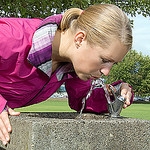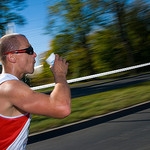Blog
Staying Hydrated during Exercise
Posted by Janine Wong MS, RD on February 18, 2013

Part 3 of a 3 part hydration series The Starting Line: What is the best way to stay hydrated during exercise? Staying hydrated during exercise is important for physiological safety and for performance. Once you’ve assessed your individual fluid needs, the next step is to develop your hydration plan. Before Exercise: Ideally, when starting an exercise session, you should be in a state of norma...
Over Hydration and Hyponatremia
Posted by Janine Wong MS, RD on February 11, 2013

Part 2 of a 3 part hydration series The Starting Line: How can I prevent exercise associated hyponatremia? Exercise associated hyponatremia was first documented in the 80’s by Noakes and colleagues, and was called “water intoxication”. Hyponatremia means low (hypo) sodium (natre) in the blood (mia). Specifically a blood sodium concentration below 135 mEq/L defines hyponatremia...
Assessing your hydration needs
Posted by Janine Wong MS, RD on February 4, 2013

Part 1 of a 3 part hydration series The Starting Line: How can I tell if I am dehydrated? It is an undisputed fact that hydration is important in daily activities, and especially in exercise. Dehydration resulting in a 2% change in body weight has been demonstrated to impact aerobic performance. Physiological consequences include increased strain on the body during exercise, increased heart rate and ...
Breakfast and Weight Loss
Posted by Janine Wong MS, RD on January 21, 2013

The Starting Line: What type of breakfast is the most beneficial for weight loss? Breakfast is the most important meal of the day. It has become a cliche, but years of research support it. However, the frequency of skipping breakfast has increased from 14% in 1965 to 25% in 1991. Some people believe that cutting breakfast is an easy way to limit calories and lose weight. Studies have found that this str...
Barefoot Running Effects on Injuries
Posted by Toran MacLeod PT, PhD on January 14, 2013

The Starting Line: Can running barefoot help prevent running injuries? Traditional running shoes have cushioning that allows for the comfortable rearfoot strike pattern present in 80% of runners. This rearfoot strike is associated with an impact spike in the vertical ground reaction force, which creates high loading rates within the leg. Over time, these repetitive loading events may lead to injuries su...
